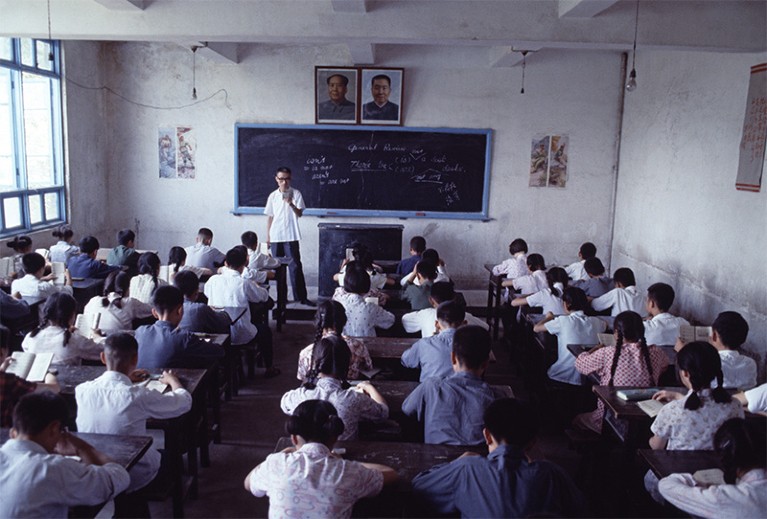
School students in Xi’an in 1978 take an English lesson.Paolo KOCH/Gamma-Rapho via Getty Images
Ren Xiaobing completed his PhD in materials science at Xian Jiaotong University in 1994. He continued his research career in Japan, before returning to China through the Chang Jiang Scholars Program, a talent-recruitment scheme that encourages Chinese academics working abroad to come home. In 2010, he established a multidisciplinary research centre called Frontier Institute of Science and Technology (FIST), with 200 million yuan (then about US$30 million) in funding from Xi’an Jiaotong University, where the centre is based.
How has the science scene changed since you started out?
For scientists 20 years ago, resources were very limited, information was restricted and education was poor. If you had any opportunity, no matter how tiny, you had to grab it. So everybody had to be very tough. It’s very different now. Funding has hugely increased and laboratories have world-class equipment. You can also get the latest information from abroad. So, young researchers have more opportunities, but they also face a lot of competition from their peers, because there are many more scientists. The pressures have changed.
Why did you become a scientist?
My parents had no experience in science and technology. I entered middle school in 1976, the year of Chairman Mao’s death. This was soon followed by the end of the Cultural Revolution, which had been a nightmare for Chinese intellectuals. The government’s propaganda shifted from anti-intellectualism to pro-intellectualism. Foreign and domestic scientists suddenly become stars, and science became a respected, important profession. This change affected many teenagers, including me. I become enchanted with science and started a small chemistry lab in my home; I also made my own transistor radios from scratch. Today, the government still encourages people to be scientists, but there are many other ways to be a star, so young people don’t always listen.
What makes a great scientist in China?
I don’t think there’s a simple recipe for becoming a great scientist in any country. Doing science means you encounter more failure than success. That’s a scientist’s life. Success doesn’t always come because you are the cleverest. Those with mental strength and a strong sense of curiosity and motivation will succeed. In China, young scientists must also learn to work well as part of a group, because most large-scale governmental grants are given to research teams.

 Career guide: China
Career guide: China
 Hong Kong builds a science-based future
Hong Kong builds a science-based future
 China’s Zhejiang province is open for science business
China’s Zhejiang province is open for science business








